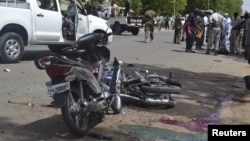The detention for several months of 84 children in Cameroon has highlighted concern that the regional campaign against Nigerian Islamist group Boko Haram is leading to rights abuses.
Amnesty International called Friday for the release of the children, some as young as 5, detained by security forces in a raid in December on Islamic schools in Cameroon's Far North Region, which authorities said were Boko Haram training camps.
A government spokesman was not available for comment.
The report came as Niger's National Commission for Human Rights (CNDH), a state body made up of lawmakers, civil society figures, magistrates, lawyers and union leaders, denounced a wave of arbitrary detentions under a four-month-old state of emergency to fight Boko Haram.
It said some detainees had been tortured.
Crackdown in Chad
Meanwhile, neighboring Chad pledged Friday to round up beggars and some foreigners as part of a crackdown, days after 34 people were killed in attacks on the capital blamed on the Islamist group.
The countries' joint offensive with Nigeria this year has liberated large swaths of territory from Boko Haram, which has killed thousands of civilians in a six-year campaign to carve out an Islamic state.
But Amnesty voiced concern the crackdown risked a repetition of the kind of heavy-handed tactics used by security forces in Nigeria, where it said this month more than 8,000 people had died in detention.
"There is a real risk of human rights violations in all of the countries threatened by Boko Haram," Steve Cockburn, Amnesty's deputy regional director, told Reuters. "The countries that are also threatened by Boko Haram do not have to repeat the same mistakes and the same errors as Nigeria."
In Cameroon, Amnesty documented a rise in arbitrary arrests by security forces and disappearances between November and February following a spike in Boko Haram attacks, Cockburn said.
A senior Cameroon military officer told Reuters in February that nearly 1,000 suspects were in various prisons in the north.
Authorities launched an investigation after 25 Boko Haram suspects were found dead in a prison cell in December.
Cockburn said Cameroon's government had voiced its commitment to respecting human rights.
"What we need to see is that translated on the ground," he said.
Innocents Arrested
In Niger, the CNDH said Saturday that the abrupt evacuation of tens of thousands of people from around Lake Chad following a Boko Haram attack on April 25 had worsened a humanitarian crisis in the poor region, leading to loss of life.
Niger said last month that it had detained and charged 643 people for links to Boko Haram under the state of emergency declared in February in the southern region of Diffa.
The CNDH report found that at least 38 people freed by the courts were still being held.
"Lots of the people detained in Diffa are innocent," said one magistrate in Niamey who asked not to be identified. "Now they have spent months in prison with people from Boko Haram and may come out radicalized."
Human rights campaigner Moussa Tchangari was jailed for 10 days and still faces a possible death penalty on charges of jeopardizing national defense after he published a report in May criticizing rights abuses during the forced evacuation.
Tchangari said other measures under the state of emergency aimed at cutting off Boko Haram's financing, including a ban on motorcycles and the sale of fish and red peppers, were hitting the local population hardest.
"The economy of the region is being strangled," he said.
Justice Minister Amadou Marou said the first days of the evacuation were chaotic but the situation quickly stabilized. He praised the army for saving Diffa from falling to Boko Haram.
"The problem of our friends in civil society," Marou said, "is that they think it's the government you have to condemn, while forgetting the main enemy is Boko Haram."





